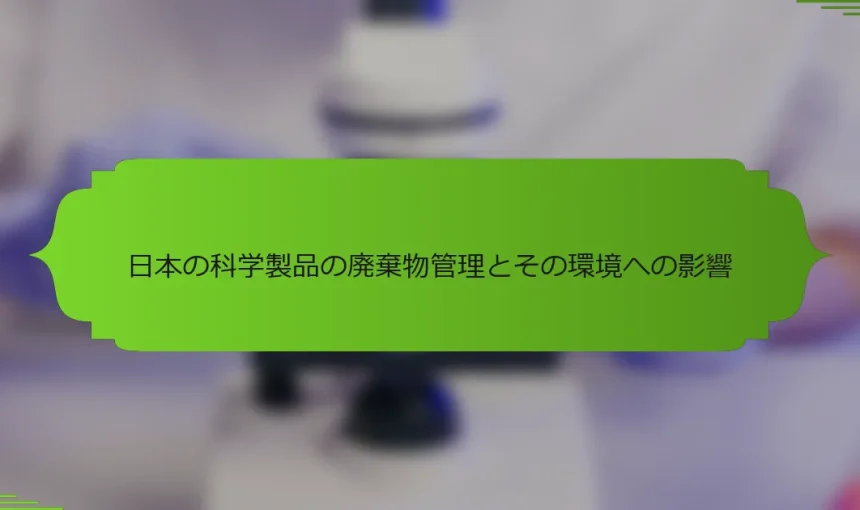Japan’s autonomous vehicle technology focuses on enabling vehicles to operate independently through the use of sensors, cameras, and artificial intelligence for environmental recognition. Leading companies such as Toyota and Honda are at the forefront of research and development in this field, with significant advancements including improved AI algorithms and sensor technologies like LIDAR. The Japanese […]
Japan’s waste management for scientific products involves the systematic handling of waste generated from scientific materials, which is crucial for environmental protection and public health. Governed by the Waste Management Law, this process categorizes waste from scientific products as specially managed industrial waste, mandating proper collection, transportation, and disposal methods. The waste management process includes […]
Japanese scientific products are developed based on advanced scientific technology, encompassing medical devices, chemicals, and electronic equipment. Known for their high quality and innovative designs, these products are widely utilized both domestically and internationally, particularly in the medical field where cutting-edge diagnostic tools and treatments are created. Proper usage of these products varies by type, […]
Eco-design in Japanese scientific products focuses on environmentally conscious product design, emphasizing the use of recyclable materials and improved energy efficiency. This approach considers the entire product lifecycle, promoting waste reduction and efficient resource utilization. As consumer awareness of environmental issues rises, eco-design enhances market competitiveness for sustainable products. Sustainable development, which aims to meet […]
Japanese scientific products are developed based on advanced scientific technology and are utilized across various fields, including healthcare, chemistry, agriculture, and environmental protection. Key examples include antibiotics and vaccines in medicine, as well as fertilizers and pesticides in agriculture. These products are characterized by high quality and reliability, often meeting international standards, which enhances their […]
The article focuses on Japanese nickel-metal hydride (NiMH) batteries, which are rechargeable batteries utilizing nickel and hydrogen. These batteries are commonly used in household appliances and power tools, recognized for their high energy density and long cycle life. The typical charging time for NiMH batteries is a few hours, and they can endure approximately 500 […]
Japanese smartphone technology is characterized by advanced communication features and user interfaces, with early adoption of 5G technology enabling high-speed data transmission. The market trends in Japan indicate a significant rise in the popularity of foldable smartphones, particularly among younger users, and a growing emphasis on enhanced AI functionalities, improving camera performance and voice assistant […]
The article focuses on the advancements in durability improvement of scientific products in Japan, emphasizing techniques and methods that extend product lifespan and minimize degradation during use. Key approaches include material selection, structural design optimization, and enhanced surface treatment technologies, which collectively enhance product resilience. The article highlights the use of durable alloys and composite […]
The article focuses on environmental protection efforts in the manufacturing processes of scientific products in Japan. Key initiatives include the adoption of sustainable manufacturing methods, such as the use of recyclable materials and improvements in energy efficiency. Waste reduction during production is emphasized, with many companies adhering to strict environmental standards. Additionally, the management of […]
The safety of ingredients in Japanese scientific products refers to the assessment of chemical substances to ensure they do not harm human health or the environment. In Japan, stringent regulations, such as the Chemical Substances Control Law, mandate that new chemicals are evaluated for safety before use, with oversight from the Ministry of Health, Labour […]









